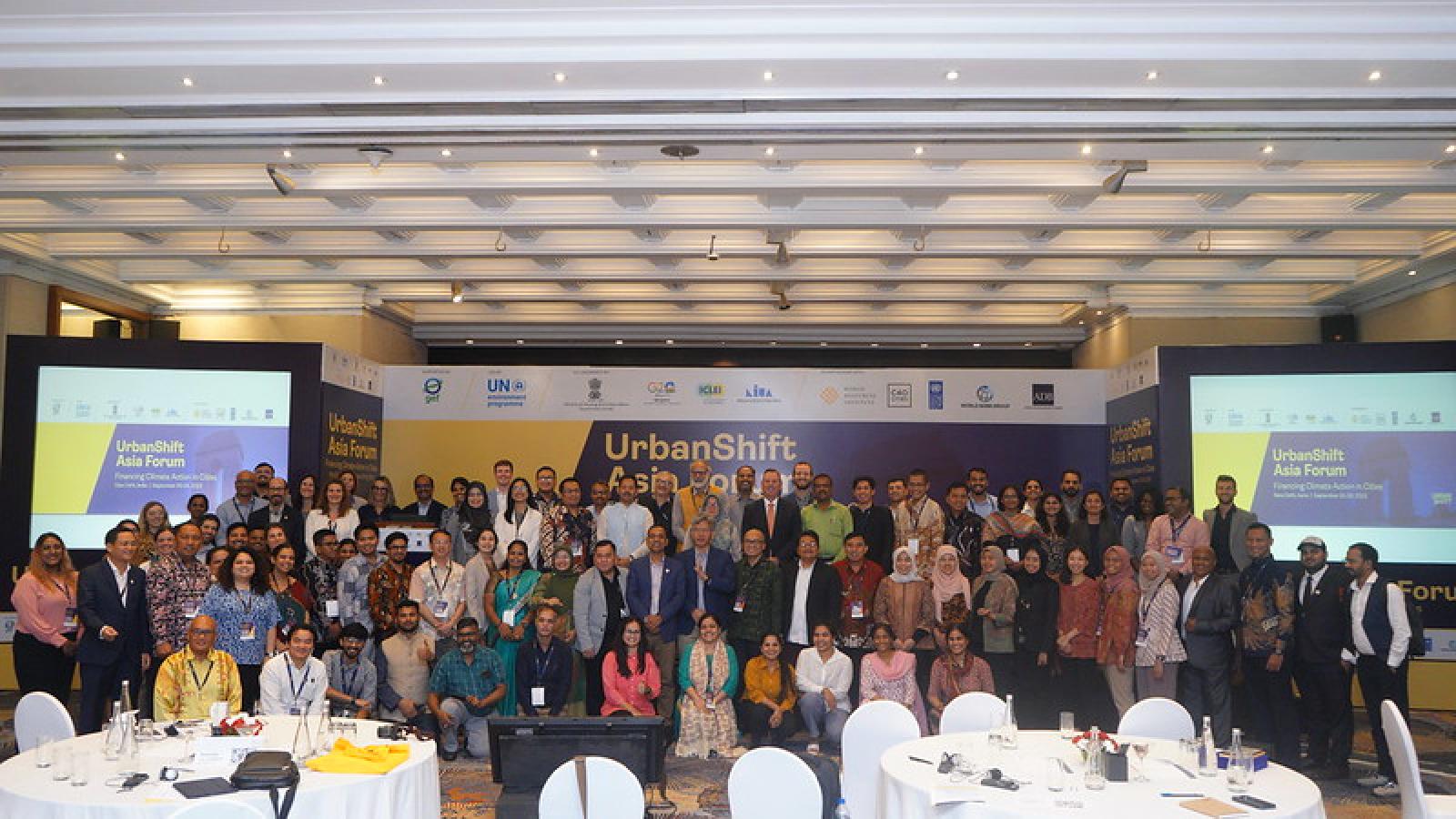Recap
UrbanShift Asia Forum 2023: Transforming cities for a sustainable tomorrow
UrbanShift's first regional forum focused on the critical topic of financing sustainable urban transformations.
In the last decade, the population of Delhi’s metro area has grown by nearly 10 million people. Over 30 million people now live in India’s capital region, which spans five states and around 1,500 square kilometers. In Delhi, it’s possible to see the challenges of rapid urbanization–which unite many cities across Asia, Africa and Latin America–play out in real time: How can service provision, from waste management to healthcare, scale quickly to meet new residents’ needs? How can clean transportation options adapt to connect a shifting metro area? How can governments coordinate across levels and across state boundaries to develop a multifaceted yet cohesive plan for a diverse region?
Against this backdrop of challenge and opportunity, UrbanShift hosted its first regional forum from September 25 through 28. For four days, over 250 local leaders and practitioners from cities in India, Indonesia, China, Nepal, Sri Lanka, Vietnam, the Philippines, Malaysia, and Jordan convened to address one of humanity’s most pressing challenges: Sustainable urban development. Organized by ICLEI under the UrbanShift program, the Asia Forum provided a pivotal platform for leaders from across the region to gather, share their specific challenges, collaborate on solutions, and build solidarity around the potential of cities to shape the planet’s response to climate change.
Cultivating collaborative solutions
While the Forum convened discussion around a range of issues connected to sustainable urban development, from watershed revitalization to neighborhood design, the theme of financing urban climate action underpinned the event. Inaugurating the Forum, India’s Minister of Housing and Urban Affairs Hardeep Singh Puri set the context, reminding the leaders gathered that “for the first time, climate finance found a notable mention in the G20 declaration”. Cities, he said, need to take this moment to localize climate action agendas and create innovative financing instruments to ensure projects are implemented. Situating UrbanShift as a product of the two most important recent climate agendas–the Sustainable Development Goals and the Paris Agreement–the Minister urged leaders to make use of the growing understanding of the importance of cities in addressing the climate crisis, and to take decisive action to implement and scale sustainable development measures.

After the galvanizing discussions of the opening plenary session, the Forum focused on connecting the leaders in attendance with tangible solutions for sustainable urban development, and with each other to discuss shared challenges and collaborate on ideas. As Nikhil Mijar, a transportation planner from Pune, reflected on the value of the Forum: “Right now, I am comforted that there are so many other cities that are facing the same issues that we are. Exchange will only move us ahead.” Two in-depth City Academy workshops on Accessing Urban Climate Finance and Accommodating Urban Growth (more details below), as well as roundtables on investment strategies and effective approaches to public-private collaboration, delved into specifics of urban development project consideration, development, and funding. The Forum wrapped with a visit to the New Delhi Municipal Council's Smart City Integrated Command and Control Center (ICCC), an innovative facility powered by real-time data. With dashboards monitoring 19 urban services from waste management to smart street lighting, the ICCC illustrated how data-driven decision-making can enhance responsiveness to local needs. Participants came away from the Forum with concrete ideas to implement in their own contexts, and deeper understanding of the common challenges and goals they are facing.

Opportunities for Continued Learning
While much of the discussions and content shared during the Forum were tailored to the participants at the event in New Delhi, UrbanShift also launched two free resources during the Forum that are available to all.
The UrbanShift Online City Academy offers eight self-paced, interactive courses designed by experts from UN Environment, ICLEI, C40, and WRI to deepen the knowledge of city practitioners in key areas of sustainable urban planning. A digital, broadly available counterpart to the in-person City Academy trainings offered during many UrbanShift events, including this Forum, the Online City Academy democratizes access to case studies, best practices, and essential resources on eight core urban planning themes.
For urban practitioners looking to strengthen collaboration with the private sector, C40 introduced "Public-Private Collaboration to Accelerate Sustainable Urban Development", a guide to successful partnerships that focuses particularly on Global South Cities. With over 30 robust case studies and five different models of collaboration to explore, this is an end-to-end guide for creating mutually beneficial partnerships that can accelerate climate action momentum in cities.
Spotlight on UrbanShift City Academy: Bridging knowledge gaps
On the second and third day for the Asia Forum, UrbanShift hosted two in-person City Academy trainings: ICLEI led “Accessing Urban Climate Finance,” and C40 led “Accommodating Urban Growth.” Both of these courses were tailored to the regional context to provide city-level actors with practical tools to address their local challenges. From understanding financing processes for net-zero cities to accommodating urban growth sustainably, participants delved into evidence-driven decision-making, using scenario modeling to develop approaches that could be applied in their own cities.
Aimed at urban planners and decision-makers, Accommodating Urban Growth offered case studies and methodologies for understanding the two complementary strategies for growth: expansion into new areas, and densification of existing ones. Helene Chartier, Director of Urban Planning & Design at C40 Cities, stressed that how cities develop now will have an outsized bearing on the trajectory of the planet and its climate risk. Quoting the IPCC, she emphasized the urgency of adopting sustainable approaches: “Urbanization is not bad per se, but it needs to be well planned, otherwise it doesn’t work. Public spaces are the living rooms of cities and where we build, what we build, how we build will shape the future of the world.”

This training acknowledged that most of the future urban expansion will happen in zones that are already experiencing increasing climate hazards, and focused on how to accommodate such expansion in sustainable and equitable ways. Experts presented on compact, interconnected neighborhood design, the need to shift away from car-centric development models, and how new urban areas can be designed to be inclusive equitably serviced by essential resources like waste management and transportation. To learn more, enroll in the online version of this course at Accommodating Urban Growth | UrbanShift (shiftcities.org)
Accessing Urban Climate Finance explored innovative financial models to fund such initiatives, translating these ideas into impactful solutions. One of the silver threads that emerged from this training was the need for local and regional governments to aggregate their projects into bigger assets, so they are more attractive to potential investors. In the training, experts shared how Project Preparation Facilities like the ICLEI-led Transformative Actions Program can help local and regional governments transform their infrastructure concepts into mature, robust and bankable projects ready for financing and implementation. After deepening their understanding of various financial instruments and strategies, city officials who participated in the course got the opportunity to pitch their project in front of a panel of financial experts and receive tailored feedback. To deepen your own knowledge of climate finance, enroll in the online course Accessing Urban Climate Finance | UrbanShift (shiftcities.org)

UrbanShift will continue to host regionally specific in-person City Academy trainings throughout the duration of the program and as part of the subsequent Forums. Now that the online City Academy is launched and available to the public in six languages, the aim is to encourage broad capacity-building in these important areas and to effect positive change through the ripple effects of knowledge flow and exchange.
Learn more about the UrbanShift Asia Forum and access event materials at Asia Forum 2023 | UrbanShift (shiftcities.org)

Asia Forum 2023
At UrbanShift's first forum, over 250 leaders from cities across India, Indonesia, Vietnam, Philippines, Malaysia, Sri Lanka, Jordan and China came together to identify urban challenges, collaborate on solutions, and connect around shared goals.




